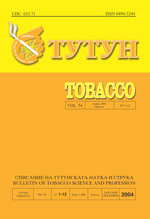|

|
|
|
|
|

|
BIOLOGICAL EFFECT OF SOME SOIL HERBICIDEs IN Virginia TOBACCO Shteliyana Kalinova Agricultural University – Plovdiv, Bulgaria, e-mail: s_kalinova@yahoo.com
ABSTRACT During 2008-2009, a randomized field experiment was conducted with 4 soil herbicides on an alluvial-meadow soil in the village Karadzhalovo, Bulgaria. The experiment was conducted with flue cured tobacco variety Virginia 0454, on a soil which had been previously planted with wheat. It consisted of Devrinol 4 F at a dose 4,0 l/ha (a.s. napropamide); Pronin 720 EC at a dose 2,5 l/ha (a.s. propizohlor); Stomp New 33 EC at a dose 4,0 l/ha (a.s. pendimethalin); Harness at doses 1,5 l/ ha and 2,5 l/ha (a.s. acetochlor). In the areas with herbicides, one mechanized processing in line spacings and one hand hoeing in the rows were carried out. In the control without herbicides, two mechanized and two manual handlings of the soil were made. The preparations were applied 24 hours before the tobacco planting without incorporation. Stomp New 33 EC in a dose 4,0 l/ha and Pronin 720 EC in a dose 2,5 l/ha showed very good to excellent efficacy against susceptible annual weeds. Pendimetalin and propizohlor help to increase the yield from 39,58% to 40,47% and to increase the average percentage of Ist class Virginia tobacco for 6,5%. When conditions for growth and development of flue cured tobacco are more favorable, the application of herbicides has less effect on yield increase. The application of soil herbicides before tobacco planting allows a reduction of manual and mechanical hoes, without an adverse effect on the culture.
Key words: herbicides, Devrinol 4F, Stomp 33 EC, Harness, Pronin 720 EC, virginia tobacco, weeds |
